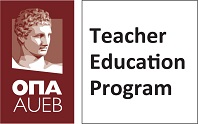AUEB launches the Teacher Education Program
TEACHER EDUCATION PROGRAM
Scientific Supervisor and Program Coordinator: Dr. Vassiliki Brinia
The Program starts the academic year 2011-2012, focuses on Education Sciences and Teaching Practice and leads to the acquisition of the Pedagogical and Teaching Competency Certificate in Education Sciences according to Law 3848/2010. The Program is a one-year program (2 semesters), is for graduate students (7th, 8th semester) and consists of the following two modules:
a. Pedagogical competence
It consists, for the two semesters, of a total of eight (8) courses in Education Sciences, 2 hours of weekly teaching per each.
b. Teaching competence
It consists ,for the two semesters, of one (1) lesson "Practical Teaching" which is analyzed in a variety of student teaching activities.
A key objective of the AUEB Teacher Education Program is to open a new professional horizon for AUEB graduates, with the training of competent scientists and teachers, who will be able to meet the future needs of Greek education.
PERSPECTIVES OF PROFESSIONAL EMPLOYMENT OF GRADUATES
New career prospects pen for students of the AUEB Departments who have received the pedagogical and teaching competence. Specifically, according to Law 3848 / 12-5-2010 on primary and secondary education, the possession of pedagogical and teaching competence allows graduates of all Departments of the Athens University of Economics and Business to participate in the ASEP competition for secondary education. Also, after having obtained some educational experience in primary and secondary education, the teacher can become an educational manager, that is to say, school unit manager, school unit director, school counselor, mentor, etc. In addition, the new curriculum of the "new school" from the 2011-2012 school year provides financial direction for the General Lyceum. This means that the economic courses in the new Lyceum are being strengthened and educator-economists are making a significant contribution.
In accordance with Article 14, a National Register of Non-formal Adult Education Institutions will be established. This means that there will be a need for scientific support of these bodies by executives with training qualifications in the field eg. of Economics, Management, IT, International Economic Relations, etc., in order to obtain the guarantees to register with the National Register and to effectively implement the learning programs under the program contracts.
In addition, each municipality (Article 8) has a local lifelong learning program, with training activities, as well as training programs for the younger generation and the elderly. Municipalities will also establish Lifelong Learning Centers and Lifelong Learning Offices. This means that it will require a skilled workforce and trainers who will carry out these activities with knowledge and teaching competence.
More information can be provided by the Secretariats of the Departments.




 76 Patission Str.
76 Patission Str.
